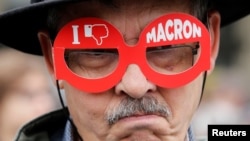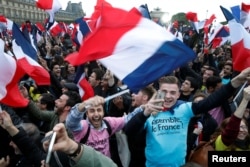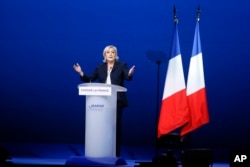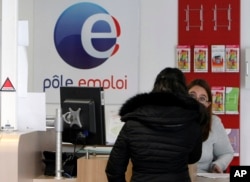Emmanuel Macron may have won Sunday's presidential election by a comfortable margin, but even his supporters' enthusiasm is tempered by the scale of the challenge that the inexperienced politician faces in tackling France's deep-seated economic, social and security problems.
Macron, a former economy minister who had never previously stood for elected office, beat far-right leader Marine Le Pen by 66 percent to 34 — a gap well above the 20 or so percentage points that surveys had predicted.
Helen Lhuillier, a 73-year-old French Canadian who has lived in France for 40 years and attended his supporters' victory rally outside the Louvre museum, said she liked Macron's "policies and his personality, his enthusiasm."
"What he has achieved in a year is impressive," she said, before adding: "I hope he will be able to make progress, but we must be realistic. He has work to do."
That work begins right away.
The 39-year-old centrist has promised to transcend the traditional right-left political divide that has allowed vested interests to block fundamental economic reforms.
And he will have to do just that to secure a parliamentary majority in June for a one-year-old political movement that has never fielded candidates for election.
"We can only hope that France seizes its chance," Parisian Michael Jeuga said on Monday.
"It's a new way of working, it's a bit different to the right- and left-wing politics we normally have ... Now we have the legislative elections and it will be a bit complicated to really change something."
Enthusiasm has its limits
Moreover, despite Macron's determinedly can-do attitude, the enthusiasm for the former investment banker has its limits.
A poll of nearly 7,000 voters on Sunday by Harris Interactive found that 59 percent of Macron's voters had chosen him primarily to stop Le Pen becoming president, reflecting the distaste that still clings to a party long considered a pariah in France for its xenophobic associations.
The poll, for M6 television, also found Le Pen's supporters to be far more convinced by their candidate's policies and qualities: 56 percent of Le Pen voters found that she spoke to their concerns, while only 21 percent of Macron voters said the same of him.
Macron plans to tackle a decade of slow growth and rising unemployment by overhauling France's labor market, simplifying the tax and pension systems, paring back regulations and spending more on education, not least in deprived areas.
Le Pen offered a radically different vision, proposing to pull France out of the euro, hold a referendum on European Union membership, and impose protectionist trade policies to shield French workers from what she called "savage globalization."
Benjamin Boss, a 26-year-old bank worker, on Monday contrasted Macron's win with Britain's vote last year to leave the European Union and the election of Donald Trump as U.S. president. He said France had rejected those who wanted to "build borders and walls, and reject immigrants."
"Now we have a person who really wants progress, so it's absolutely exceptional," he said.
One of those at Sunday's victory rally, 50-year-old nuclear technician Alain Perrouault, said he had voted for Macron primarily to counter Le Pen.
"I want to live in a democracy," he said. He added that he would also vote for Macron's party in the parliamentary election, "so that he can govern."
'Lesser of two evils'
Macron will be hoping that most voters take a similarly pragmatic line as he tackles a to-do list of unemployment around 10 percent, simmering tensions in deprived suburbs, and the home-grown Islamist radicalization that has contributed to a wave of attacks since 2015.
Unlike in the presidential election, where the traditional ruling parties were eliminated in the first round, they will once more be a force to be reckoned with in the lower house elections.
IT worker Saskia Jenesen said the sight at the Louvre of "all the young people who were really motivated by politics" had given her hope — but that Sunday's poll had seemed like a choice between "the lesser of two evils."
And many clearly shared that view — particularly those on the left who vehemently opposed Le Pen but found Macron's plans to reduce corporate tax and cut public sector jobs unpalatable.
A record 11.5 percent of votes cast were either blank or spoiled, while a near-record total of 25.4 percent of registered voters abstained altogether, official figures showed.
Even the so-called "Republican Front" — a bipartisan movement that crushed the second-round chances of Le Pen's father, Jean-Marie, in the 2002 election — proved much weaker this time around.
With 34 percent, Marine Le Pen almost doubled her father's score. Harris's analysis suggested she had picked up significant numbers of votes in the runoff from supporters of both the center-right and even the far-left candidate who were eliminated in the first round.
This made clear that Le Pen's attempts to "de-toxify" the image of her party — whose founder, her father Jean-Marie, has multiple convictions for inciting discrimination and hatred and for minimizing the Holocaust — had met with some success, even if she fell short of her goal.
Jean-Francois Perier, 76, speaking at Le Pen's post-election event, said last week's candidates' debate had gone wrong for her.
"Clearly, she didn't pass the test. There is something I can't figure out that didn't work. Now we can hope for a rebound in the parliamentary election."



